1932 Communion


 Raymond
Martin LANGNER was the second child born 09 Aug 1921, at home in Cicero, Cook county, Illinois,
to Martin and "Bess" Brunislawa Marie (DOLECKI) LANGNER.
Raymond
Martin LANGNER was the second child born 09 Aug 1921, at home in Cicero, Cook county, Illinois,
to Martin and "Bess" Brunislawa Marie (DOLECKI) LANGNER.
1921-1924 4924 31st Place, Cicero, Cook County, Illinois
1925 2930 S. 48th, Cicero, IL (lived behind father's tavern)
"Dadsie said he always had dogs when he was a boy. The only one I remember him talking about was a gray hound named Clown. Grannie said they once had a chow-chow, but I don't remember it's name." [*ML]
1926-1928 (about) Grades 1-2-3: Woodbine School 30th Street & 50th Avenue
One day in 1928, he sneaked in the back of his father's truck while it was on the way to the quarry. Just before the stones were being dumped his head popped out and they saw him in time to prevent crushing. Father raised hell with him but then stopped to buy 5 cent Hershey chocolate bars for him.
1929-1930 (about) Grades 4-5: Hawthorne School 50th & 31st
"One time while I was walking to the library, Rich, Jimmie, and I heard the pop-pop--pop of guns. There was a little tavern just below the rise of the bridge we were on. Two guys came running out of the tavern and jumped into a car that was coming down the alley. They went around to the side to Ogden Avenue. The license plate had mud on it so we couldn't read it. They had killed four guys in the tavern." [*RML]
1931 (about) 30th Place near 52 Avenue
"One winter when Dadsie was little, our grandfather hung an old carpet in the basement from floor to ceiling, and all winter Dadsie hit golf balls into the carpet. In the spring Grampa took him out on a golf course, and Dadsie's first tee shot went straight down the middle of the fairway. Others in the foursome were shocked." [*ML]
1932 5056 W. 31st Street lived here until father bought another saloon at 5060 W. 30th Place
"Every Sunday they would go down to where we used to live. There were no buildings. When you would get through the underpass at 56th and the railroad you could see to the Lincoln School which was the other side where we would go to the store. My Uncle Henry owned half of those lots. (He was a supervisor. He was rich.) Every Sunday they would find bodies laying there because the street car would go up to it. They only killed people who deserved it in their estimation. A couple of innocent people were shot and killed accidentally because they would shoot in the street. That was absolutely the final thing they would instill in us. They only killed when there was no other way because they knew it gets in the paper and they didn't want that. They still don't want that." [*RML]
1932 Communion
1932
The Gang
Flo, Lora, Violet, Florence J, Tillie, Adeline, Bebe, Josie,
Sophia, George, Jim Piasecki, Harry, John J, Norman, Joe, Ray Langner, Ferdinand
1935 Columbus School
Ray as the King
1935 Columbus School
1932-1935 (about) Grades 6-7-8: Columbus School 31st & 54th, Cicero
During 1932 (?), we went to live at 256 Elmar Avenue, Chula Vista, California for two months.
1936-1939 (about) Feb 1935 Sterling Morton School
"I got to know many by delivering milk and cream for Foley for two, three years. I used to get up at 3 in the morning. I used to start work at 3:30 and deliver a route of milk, then go to school. That's how I got my money to go out in high school and do things. Foley was next door, there was an empty lot and then the dairy." [*RML]
Ray worked at drug store as the pharmacist's helper until he saw the pharmacist cheat a very poor man.
"Your Dad [Ray] went to school with Eddie W. [WOJCIECHOWSKI]. His father was Chief of Police. He went to Northwestern and played football. He place kicked and played guard. Ray was pretty doggone good, too. He was a starting guard or tackle but he got his knee hurt in his last year of high school." [*HJL]
"Dadsie played semi-pro football for the Silver Arrows when he was also on the high school team. He was the youngest on the Silver Arrows." [*ML]
"Johnny Patakas and I had an economics class, G. L. Royce was telling us all about the big money and stuff then the Kentucky Derby comes up. Patakas flips about a hundred dollars worth of tickets. He said "I lost this Saturday at Churchill Downs." And Royce says "Oh my God, that's two months pay!" We also had Johnny Kotenus in our class. His brother was Nicky Kotenus who was big in the Syndicate as a hit man. He used to hang around over at the Rock Gardens gambling house at 22nd and Cicero." [*RML]
 |

Number 42 |
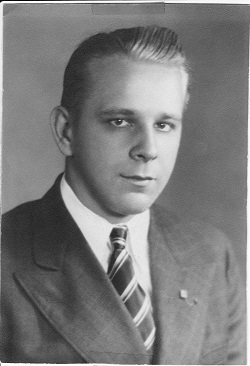 |
Friend and him picked up some hot suits and tried to sell in another part of town. The people running that part of town chased them back where they belonged. They were shooting out the car windows at them even while passing the police department. Finally left them alone when they got to the syndicate's headquarters.
My father "was the President of the syndicate's Dreamland dance hall. When they were short of workers I would go there and work as a bouncer. I was throwing guys out who were twenty-one and I was eighteen. I played [soft]ball then." [*RML]
"He had a tavern. The restaurant next door was Patakas'. Behind the restaurant he and Patakas had a gambling house. I went to school with Johnny Patakas, who was a fighter pilot [during World War II]. We would leave high school about 11:00 am. We were off 11:00 - 1:00. We would go over there and put up the morning line for the races. Johnny Patakas would run the Chuck-Luck game during our lunch hour." [*RML]
"I got out of all that because my father didn't want me to be in it. He said, "Stay away." He didn't want me to get involved deeper than that chicken-shit stuff I already did." [*RML]
Ray worked at Continental Can Company for six to eight months forking cans from line into bags.
1941 started working for Diamond T until war.
His father, Martin LANGNER, worked at Diamond T. "I went there [Diamond T] to take his lunch when he forgot it once. That's when I first met Tilt, the owner. Diamond T made well-known trucks. During the war they made tank transports. We made the first successful half track with 105 mil of howitzer on its back. I was the youngest driver of tank transport in the Fourth of July Parade down Michigan Avenue before the war in 1940 or 41. It had two transmissions. A guy left one idling. Uncle Wally was a guard over there at the gate. He had to go to the toilet. The thing slipped in gear and rolled right over his booth and right to the wall which held it. Uncle Wally was glad he had to go to the toilet." [*RML]
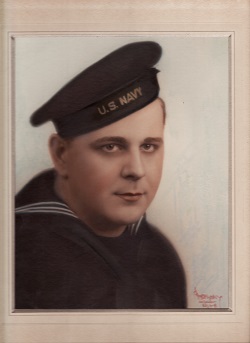 |
 |
"September 12, 1942, I joined the Navy. Father knew the Naval enlister and got me assigned to the 'Navy's Country Club' at the new Glenview Airbase as a machinist. ... 1st before Truman ... VP came ... Wallace. 1,000 guys. I knew many of the guys well from dairy route: Drake Hotel's pastry chef/baker. Steven's Hotel cook - petit four desserts. Kahgal's chef (Hotel north of Cicero). I washed pots and pans, sliced bread, and such for about 7-8 months. I was at Glenview for two years." [*RML]
"I got to know Cagill by delivering at some north side hotel. When I got on the mess duty, here is the guy who was chief of the mess kitchen was Cagill. I walked in there and some guy says "You, you do the pots and pans." I turned around and said "Christ Cagill, you're the chief here and I'm going to do pots and pans?" He said "Here, come on with me." And he gave me a job slicing bread. "If you want to work in here ...""What the hell am I going to do in here. I can't even boil water?" Cagill said, "We have a lot of things to do. You work one day and you'll be off two, you work another day, we have three day weekend. ...". "What's the job Cagill, what's the job?" So I worked there for seven or eight months, cleaning the stove, ..." You get 24 hours on like a fireman but you are only there for the mealtime." [*RML] [Croydon Hotel was at Central Park, across the Street from the Medinah Temple on the north. Across the street to the south was the Berkshire, that is where wife, Katharine Langner, was working on Pearl Harbor Day. Tom Prevenas had the restaurant concession.]
"After mess duty, I drove a gas truck in Glenview. That's how things were. I had finished two courses of aviation machinist and I was driving a gas truck. That's where I was driving at night. We went up the line filling all the airplane tanks. You couldn't leave an airplane when it wasn't full so there wouldn't be any condensation in the gas tank. I was driving back from the line, you turn and go along side of the hanger and the tower. I turned and that is all I know, I woke up in the hospital. There was a cab over engine truck and there was an exhaust manifold that was leaking carbon monoxide. I past out right at that turn. I hit a post and knocked the tank off the truck. I was laying in 1000 gallons of high test gasoline. They picked me up and took me to the hospital. I haven' t been the same since. That saved my behind. The chief didn't like me and was looking to get my butt. Instead he got in trouble for having a leaky manifold. So, I got out of the truck driving." [*RML]
"I became a plane captain on the operation line. Finally, I got to use aviation machinist stuff. I had my own SPD, Douglas Scout Dive Bomber. I wanted a SP2C but I didn't get it. I took care of the airplane. I did all the minor adjusting, tune-up, etc. That's when I learned to fly. I met Shoemaker. I knew guys from whom I could buy Scotch when most people couldn't get it. Shoemaker was a navy pilot and taught me how to fly. It was illegal, he took a big chance. When we would get to the field at Half Day, Shoemaker would get out and let me fly. I used to buzz your mother's cottage. I would drop messages to your mother. I knocked Eddie off his boat. We came so low he got out. Then we used to take an airplane Shoemaker and I and one other. There would be three in a flight. We used to go to Half Day or some place like that. Every one of the trainer planes, the Steermens, had big numbers on them. We would take friction tape to change the numbers, then we would go to Glenview and do stunts over the field. They would get their glasses to take the numbers but never find the plane." [*RML]
"Eddie Woggie [WOJCIECHOWSKI] had a buddy at a Northwestern fraternity who was from Council Bluffs, Iowa. He came through as a cadet. I knew him very well already. When I saw him sitting there waiting for his initial flight I went over and talked with him. Then I got the guy at the board to assign him to my plane. He was assigned to Shoemaker too because Shoemaker was my pilot. And he started flying with Shoemaker and we all started talking. Shoemaker found out that I knew him real well. So, he went to the corps cadet captain and got him liberty to go out with us. We would go out to Wheeling, Wilmet, ... and had a hell of a time. About six months later he comes back as a flight guy on a big Gull winged F4U Corsair fighter plane. If you saw the show with Robert Conrad in it, when he was Pappy, that kind, the SVC. The funniest thing about it was that he couldn't drive a car. I can't remember his name." [*RML]
The first date with his future wife started at 2:00 a.m.

|
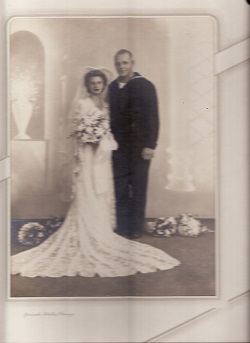
|

|
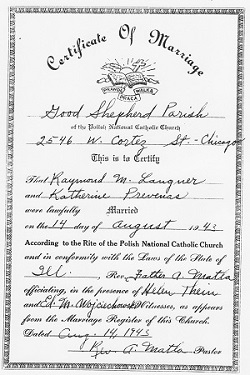
|
Raymond Martin LANGNER and Katharine Mary PREVENAS were married 14 Aug 1943, at the Good Shephard Church, 2546 W. Cortez Street, Chicago, Cook County, Illinois.
"From Glenview we went for a couple of months to Fort Lauderdale Naval Air Station. We went in August and stayed in a hotel in Miami on Biscayne Blvd for a week or so. Then we rented a place in a suburb of Ft. Lauderdale. We brought all our stuff in. Your mother hung up all the starched white uniforms up. We brought the suitcases in. Then we decided to go out to eat and stuff. We got back in the dark. We flipped the light on and you couldn't see the uniforms because they were loaded with bugs eating the starch. It was loaded. You went to the toilet and flushed the ants down. The shower was loaded with spiders. Well, when your mother got down with all that screaming she went to the kitchen. We were going to have a can of soup. She went to open the drawer for the can opener and it was loaded with big tarantulas. Ahhhh! ! That was it. We took the suitcases and out we went. I went to tell the guy next door that we weren't going to take this place and they were walking around barefoot. We slept in the car that night. When you would drive down the road at night you would here a crunch, crunch, crunch. The sand crabs would be running across the road and you would run them over. That's Florida, it was terrible. At that time the Fountain Blue Hotel would use a railroad car of DDT every year to keep their hotel bugless." [*RML]
"Then we finally got an efficiency apartment. It was a nice apartment. You had a spring and mattress on the floor, a toilet, and a kitchen/living room. We were on the second floor. Russell Satler and his wife were on the first floor. There was this mean old landlady. She was a grouch. Betty would iron on the floor, she didn't have an ironing board. One day she burnt the rug. She knew the landlady would kill her. That would be the easiest way out. We didn't know what to do, so we moved a chair over the burn. The chair was three feet from the wall. One time we brought some ink down for her to borrow. We didn't have ballpoints then. Well, the lid must not have been on tight. All the way down the stairs the ink dripped on the stairs. We worked like dogs trying to get that off. But we couldn't get it off. Finally, we got dirt and made it real dirty so it wouldn't show up." [*RML]
"There was a hurricane while we were there. I was the last car to get out of the base for liberty before they closed the base. Otherwise I would have had to stay there for 48 hours. They made everyone there work to shut everything up, board up the windows. They flew some 200-300 planes up to Georgia to get them out of the hurricane area. And I was out free. Russell got stuck." [*RML]
"One day I went to the base in the morning. Your mother put all the clothes in the bathtub to soak and wash. I came home at 10:00 that morning. We needed to pack and get to Norfolk, Virginia. So we squeezed all the clothes out. We hung them in the car to dry them out on the way." [*RML]
"The best breakfast we ever had in our lives was in South Carolina [when we were driving to Norfolk, Virginia from Fort Lauderdale, Florida]. The southerners were terrible to the Yankee soldiers. I, your mother, and another sailor, Jimmy Stones drove down to Florida together. We ordered coffee and they went and got canned milk and put it down for us. They charged Jimmy twenty cents for a malted. They were terrible. So when that breakfast was so good, we really remembered it. We had thick, real Virginia ham, eggs, baking powder biscuits, potatoes, real coffee, and apricot preserves for the toast. It was good and they were so nice." [*RML]
"The northerners were good to servicemen. They couldn't do enough. In restaurants, people would pay the check for them. You could ride the streetcars for free. They would by the servicemen a drink. But the south was different. But, I can understand it because they have all those Yankee Niggers down there. At Sears in Miami, they had drinking fountains a couple of feet away from each other. Over one was a sign that said Colored. I couldn't figure out why they would have colored water. We didn't realize they had separate fountains. They got all those Yankee Nigger servicemen sent down there. And when they were told to go eat at the back door of the restaurant's kitchen they weren't used to that and started trouble. Then after the war those went back and started all of this. That's how Jessie Jackson made his millions. He never had a job in his life. He just was "helpin' the poo'"." [*RML]
"I spent 2-3 weeks in Norfolk. Your mother went home with my parents and then came back. In Norfolk, we went to the planters store. You never saw so many peanuts in your life. I bought a big five pound bag of fresh roasted shelled peanuts. Your mother came back to visit one day and I left the next day. My parents came to take the car back with your mother because she couldn't drive. When she got home, I was still there and so your mother took the bus back to Norfolk. She arrived late in the afternoon and I got my orders to leave the next morning. So, she got back on the bus and had to stand all the way to Washington DC it was so crowd. I got on the Helen Hunt Jackson. That was the name of our Liberty ship. We went to Oran, Algeria via that island in the middle of the ocean that they used to use in the those transoceanic south of France. We passed the island, we could see it, we were that close to it and then into the Mediterranean. Then we were in Oran. We had a little camp set up like a concentration camp for the navy. We were milling around for 2-3 days. We didn't know what to do. started talking to the wire man, you know the wireless. And, he is telling me the captain is sending messages to Washington that such and such a contingent is here but there papers didn't arrive. Washington was telling him that was impossible, they weren't scheduled to go for another two months. The captain sends the answer back "Two months my ass. They are eating my food." That was November 23 that we went into Oran. (That was my father's birthday.) We weren't even suppose to be there. When we got on that ship, it went to Oran. When the captain on the boat told us "Now that we are out to sea, I can tell you that our destination is Oran." I didn't know Oran from Iran. Where the hell is Oran. In was in Algeria. We carried rifles, and pith helmets, and we were all equipment. It turned out that was only for transportation. We were in Oran for weeks. They got us on a cattle train. All of us were into a box car for 2 nights, 3 days. And I was the only guy out of 300 who was a Yankee from the north. Oh no, there was a guy, Louchke, from Chicago. I was from Cicero. (He was in our wedding.) Everyone was from Tennessee south. And old Grefer, his father was the district attorney in New Orleans." [*RML]
"They would come and throw a case of C-rations at each car and that was it. You ate. Greefer fought for a can of beans the second day. They were the best. Before we got on the train we got our information that the Arabs were for the Germans. So, don't eat anything from the Arabs. They were known to hypo poison into fruit. They would give you an orange, you would eat it, and you'd drop dead. So, you couldn't eat anything on the road. All you had were the C-rations with two pieces of toilet paper in the box, three cigarettes, and a piece of chocolate candy. But, we fought for the beans. Out of the three hundred guys, one of us got the beans. That means the other two hundred didn't eat. Well I guess there were some who would eat anything. It took two nights and three days until we got to the air base on the African west coast near Port Lyautey, French Morocco. When we first got there, they didn't expect us so we were in tents." [*RML]
"If you got up to the point you could actually see the Atlantic ocean. We were just below Spanish Morocco. Flyers had to be very careful because if you flew over Spanish Morocco, they would shoot at you. The same thing was true of Gibraltar. There were three mountains and we were below in the middle and there was one place were it was open. Our planes would have to come in cross winds. They would take off turning up between one of two mountains or out to sea to get around Spanish Morocco." [*RML]
"I was fortunate being at Port Lyautey. We were Fleet Airway 15 Headquarters. Everyday we got at least one big airplane coming out of Maryland with orders. The officers got 8 gallon can of coffee cream. We had steak every Sunday with ice cream for dessert. The guys in the army would have to make the 90 mile truck trip to our place from Casablanca. They would give up their liberty to get to make the trip on Sundays because we ate so well. Our bread came every morning from the bakery 30 miles away in Rabat." [*RML]
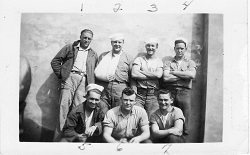 |
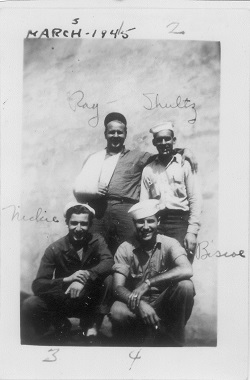 |
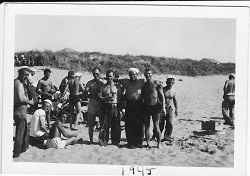 |
"After a couple of months, they moved us into the barracks. I was sitting on my bunk one time when the guy who had the locker next to mine came from taking a shower. He opened his locker door and it had a picture of my cousin, Maxie [Raymond Maximillian LASZEWSKI]. I asked him 'What the hell are you doing with that picture?' He said, 'That is my brother-in-law.' I said, 'That's my cousin.' So, I met Frank FUDACZ, 'Rene Laszewski's husband, in Africa. (Maxie died in Iwo Jima. Rumor said the military sent to Iwo Jima those soldiers who had seen too much of the war to be able to return to the states and live a normal life.) Frank had been there almost two years already. We got to be good friends. Frank liked the French people and knew all the farmers. They would invite him for dinner and he began to drink wine with his meal. His mother-in-law called him a drunk because he liked to have wine with his meal. That Aunt Kate (Katherine Gramza LASZEWSKI) was something else. I was there for two months then. Frank and I went to the movie show in a big semi-circular shaped Quonset hut. After the movie I said, 'Lets go and get something to eat.' Frank said, 'What the hell are you talking about. Everything is closed up.' We went into the back door of the mess hall. I knew all the cooks and said 'Well, what have you got tonight?' 'We have some hot dogs, some ham, ...' I said, 'Let's try the ham and cheese sandwich.' Frank said, 'Yeah, sure.' So, they made us some sandwiches and coffee. Frank said, 'Son of a bitch! I have been here two years and couldn't get anything but black coffee. You have been here two months. I didn't even know this stuff was here.' So I asked him, 'How many bottles of brandy have you given them?' He said 'What do you mean?' We used to drive out of Port Lyautey with the gasoline truck several miles away to the gasoline dumps where they used to bring the gasoline by boat. We would load the tanks and come back. When we would go there we would buy brandy and put it in the real compartments so when we went through the gates, the guards wouldn't know we had anything. I would give a bottle of brandy to the cooks, etc. I made a lot of friends that way. Fudacz was surprised at that, he didn't know any of that stuff went on." [*RML]
"I lost one hundred pounds during the war because I didn't eat any of the meals, just the snacks. I was down to 235 pounds when I came home from overseas. That was the thinnest I ever was." [*RML]
"We were Fleet Airwing 15. When the war progressed a little bit Fleet Airwing 5 was at Milan, Italy and Fleet Airwing 7 was in London, England area. When they had to deliver things to each other, papers, orders, etc., they would pick a crew and fly one of our bombers out. Whenever they went to England they would always have engine trouble over Paris. When the plane would land, one of the mechanics would get out and he would pull the plugs on the little magneto switches so the engine would run ragged. Then the guy at the airbase would say 'yeah, you better have the plane worked on, stay over 24 hours.' They always brought a big canvas that everyone had thrown things into; cartons of cigarettes, sheets, .... They would divide it all up so they would all have money etc. so no one would be short on the 24 hour trip. Then they would all have a hell of a time, come back, flip up the magnetos and continue on their route. They used to buy pornography. One day the chaplain took the flight with them. He didn't know about the trips and was fit to be tied. When they got back he went right to the Captain and told him that those were not official flights, they were pornography transfer flights. The Captain asked why the Chaplin didn't stop them. No action was taken." [*RML]
"We had these flying boats, amphibians, Catalinas. They had the two engines on top wing. When you go in there they would fly and you could open the blisters for the guns. When it was nice out they would open the blisters for all the fresh air. But, if you would pee out of the front blister, the streamlining was such that it would go right into the back blister. They would take the new guys up there and have them sit the back as a joke. It was also common for the guys to always pee over Germany." [*RML]
"When the war was over, our field was one of the transfer fields for the army. The army used to send these big B-l7 and big cargo planes back to the states filled with troops. They would come through our place. We use to have to get up at 3:00 in the morning to gas them up. They would come up and get a little five gallon can of hot coffee and a few sandwiches. Then they would get in the plane and take off for Dakar. They would fly across the narrowest part of the Atlantic to South America and then up to Florida." [*RML]
"When the war was over, they were sending new bombers over and Frank Fudacz was assigned the task force to take them apart. So they would fly from our air manufacturers down to South America and across to our field and start tearing them apart. And in them they had over-ocean survival packs which had those special one pound chocolate bars that wouldn't melt under 110 degrees. He used to pull them out and give them to me. At one time I had as many as ten of them in my locker. The same thing with cigarettes. That's how I got that parachute bag with my name on it. A guy was a big sign painter, an artist, before the war. I gave him a big candy bar, he gave me a personalized parachute bag." [*RML]
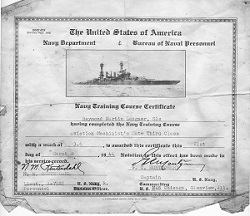 "I
went to Africa in November and came back to the states in August. And,
I was only back because of a problem. I was expecting to come back home and
then proceed to the Philippines. They dropped the A bomb while I was home so
I wasn't needed in the Philippines. I was given an honorable discharged on
November 11, 1945." [*RML]
"I
went to Africa in November and came back to the states in August. And,
I was only back because of a problem. I was expecting to come back home and
then proceed to the Philippines. They dropped the A bomb while I was home so
I wasn't needed in the Philippines. I was given an honorable discharged on
November 11, 1945." [*RML]
"He hated the Navy. One example of distasteful facets of the service was having to take orders from a man who argued that there were two ways to spell 'six.' [*ML]
"Dadsie burned his uniform immediately on discharge so they couldn't even ask him to march in a parade." [*ML]
1945-1946 (about) Morton Junior College
Deutch slop boy - cleaned Lithograph Press. (Brother-in-law Harry PIETRZAK cleaned entire machine at night during 8:00 - 8:00 shift earning $25 per week.)
"In the beginning Uncle George [THEIN] and Dad hated each other. They just couldn't stand each other. Nobody knows why. If we would go visit Helen, Ray would take his comic books or something and go and read in the living room. George would take his newspaper or book into the bedroom. Helen and I would visit. When we were finished visiting they would come out and we would go. That went on for a lot of years. Then we went to California. When we came back, George swore that Ray changed and Ray swore that George changed, and they were buddies. After that they were best friends. Dadsie always said that he thought it was because Uncle George's mother came from Germany and the family all treated her nicely. She was here about a year or so before she died from the effects of malnutrition. All she could eat was rice." [*ML]
"We lived with Jimmy [James Peter PREVENAS] until my mother died [Mary Katharine (ZABSKI) PREVENAS, 16 Mar 1946]. Then Ray's parents built a couple of rooms in their basement for us to live in. He went to Morton Junior College. They didn't realize he hadn't finished high school. The high school and college were in the same building." [*KPL]
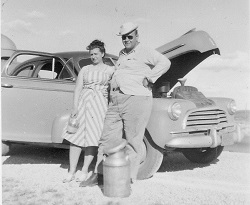 |
"After junior college we bought a trailer and hauled it to California where he attended UCLA." [*KPL]
"We had a nineteen foot trailer we were pulling to California through the mountains. Jimmy and I are telling your father to slow down, we can't see the scenery with him going so fast. He didn't say anything. Then when we got down the mountains he was wringing wet. The brakes had gone out and the trailer kept pushing the car faster and faster. We got to one place one night and we looked and our chimney was missing. And, Uncle Jimmy said, "Oh that must have been that noise I hear when I went under that tree." He knocked the chimney off and never stopped to look or anything." [*KPL]
We sold the trailer and bought a house in Pacoima. He changed his major from engineering to math so he ended up taking five years to get a four year degree. GI bill paid tuition and a monthly living expense." [*KPL]
 |
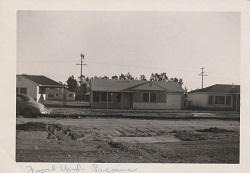
Front yard |
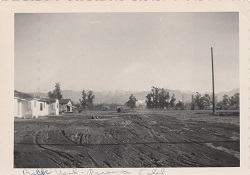
Backyard |
In 1948, they bought a new house at 12938 Wingo St, Pacoima, Los Angeles County, California.
"They built the subdivision in a dammed river bed. We were in a valley and he had to go over the mountains to get to UCLA. Of course, he went twice a day. And, he was a smart ass. When he would see an out-of-state car behind him, he figured they would think he knew the road and they would just follow him. He would go like hell. When he would get to a curve he would hit the gas and the brake at the same time to get the traction to make the curve. The car behind him would squeal their tires and go all over the road trying to make the bend. He thought that was so funny." [*KPL]
"He took Meteoritics. For his paper he studied the Meteor Crater outside of Flagstaff. Marty and I stayed up above. There was just a little shack up above with a guy in it. He asked if he could go down into the crater. He took Kilroy with. She would go ahead and scare all the snakes away." [*KPL]
"He had gone to a psychic a couple months before that. We used to go to a spiritualist church on Sunday afternoons back then. She said he was going to go where there were a lot of snakes, rocks, and climbing. He said, "Not me, I hate snakes." Well that's where he went, to the Meteor Crater." [*KPL]
"Yes, we went to a spiritualist church. We tried to do stuff, send messages to different people We would sit in a circle. The woman would have a basket and pass it around the circle. Everyone would have to put something of theirs into the basket. Then, they would pass the basket around and everyone would have to pick out something. Then you had to sit there and tell her how and what you feel while holding what you pick in your hand. She tried to help you develop your senses so you could tune in and do it. There were a couple times that I would say something and the next week the person would come in and say what turned out. That was when I first heard the peacocks. We heard a horrible screaming like someone was being murdered." [*KPL]
"He loved palm trees." [*KPL]
 Their
first child, Marty, was born 29 Nov 1949, in California.
Their
first child, Marty, was born 29 Nov 1949, in California.
"We had a beautiful rose garden in California. He did a lot of work putting in the yard. He was proud of the curved sidewalk we put in too. We didn't want to leave California, but he just couldn't find a job. When we came back to Illinois they said he needed a couple more classes to teach in Illinois and we just didn't have the money for more schooling." [*KPL]
"Dadsie was the first editor of the UCLA [University of California, Los Angeles] student newspaper. He earned a degree in Mathematics from UCLA. He loved going to school and said if he was wealthy he would have spent his time taking classes continuously." [*ML]
"When got back to Illinois, he visited the principal at Morton High School and asked for a high school diploma." [*KPL]
"I went to Western Electric. Ma got me interviews three times. I walked in there past the guards at the big iron gates. It reminded me of the Joliet prison. You go for the interview and someone is with you all the time. You can only get out if you go to someone who gives you a special pass to get out. I never took a job there. I couldn't imagine all these 30,000 people couldn't go out to go home. If you felt bad you had to go to their own little hospital in there. Then, maybe the doctor would sign a tag for you to get out to get the street car to go home. I could not work under those conditions." [*RML]
1950 4417 Harvey Ave, Western Springs, Cook County, Illinois
 1953
home in Cicero, Cook County, Illinois
1953
home in Cicero, Cook County, Illinois
1954 Their daughter, Norma LANGNER, was born 14 Sep 1954.
"Went to work for the CMO [Chicago, St. Paul, Minneapolis and Omaha Railway] railroad. Ray worked in the office for Askania. When they consolidated he was laid off, and we moved to Glenview, worked at Flexonics (made stainless steel cables) accounting department." [*KPL]
"Once when Dadsie worked for the railroad, a freight car carrying peanuts to Mars candy factory derailed and broke open. Like all the rest of the railway workers, he brought home a big sack full, but they were raw. Uncle Tommy was living with us, and he and Dadsie spent all evening french frying and eating them. Both were sick as dogs until dawn." [*ML]
1956 Glenview, Cook County, Illinois
1958 Breezy Acres neighborhood in Rockfalls, Whiteside County, Illinois
After a couple of years with Flexonics, Ray was transferred to Rock Falls as plant controller where they did a lot of space government missile work. They sold out to another company and he was laid off." [*KPL]
In 1960, he moved the family to 1028 S. Neltnor Blvd., West Chicago, DuPage County, Illinois when began to work for Hallicrafter. They made radios and shortwave electronics.
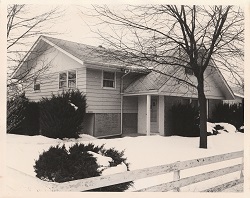 |
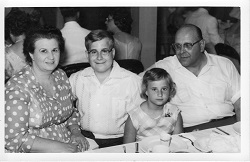 1962 |
"Hallicrafters sold to Chicago Musical Instrument Co. Offered a job in the Lowrey Electronics division, in the same building, as Director of Finance, Comptroller." [*KPL]
"When computers were just starting to enter business accounting, the IBM company flew Dadsie Na Mumsie to their facility in California to teach him their new stuff. IBM put him in a class with financial executives from around the country and gave each person a mock company to run for their week of computer exercises. It took Dadsie two days to run everybody else out of business." [*ML]
"During one financial meeting at Chicago Musical Instrument's central office, Dadsie was representing Lowery and making some point about what they should do. One of the big shot money guys was impressed with Dadsie's argument and said he had never heard of such a plan. He asked Dadsie where he got the formula on which he was basing his argument. Dadsie told him he didn't get it from anywhere. He derived the equations himself." [*ML]
"Dadsie worked at Lowery which was a part of the Chicago Musical Instrument Company. Lowery always made money because Dadsie kept the books. Chicago Musical Instrument sent Dadsie and someone else up to the Gibson Guitar Company because they made such good guitars but never any money. At Lowery he would take a walk in the factory after lunch for a couple of hours. So, he did the same thing when he was visiting Gibson Guitar. He found out things like the fact that there were two complete lines for making the guitars. The fellow running the place had no idea there were two separate manufacturing lines. The man had never been out in the plant. So, that was part of the problem. They had big meetings about what Gibson's problems were. One of their problems was 'Boy, they just can't get the materials they need.' Dadsie wanted to know 'What's the problem? Wood is wood.' 'Oh no. We need Sitka Spruce from Alaska and all that stuff goes over to Japan and we just can not get any.' So, Dadsie said 'Wait a minute.' and picked up the phone. Right then during the meeting he called and asked for the number of the Secretary of Agriculture in Alaska. He gets on the phone and says 'Hi, Violet? This is Ray. How are you doing? ...' The people at the meeting were flabbergasted. They couldn't understand how he knew everything and everyone, even the agriculture people in Alaska. And of course, Dadsie would never tell them that by chance Violet was his sister-in-law. He told her what the problem was and she put him in touch with the right people. Gibson Guitar had no trouble getting their wood after that." [*ML]
"Lowery had only one customer. As did all the other subsidiaries of the Chicago Musical Instrument Company [CMI], they sold all their organs to the Chicago Musical Instrument Company. Lowery was the only one that consistently made money each year. Dadsie would do things to ensure Lowery would have the profit at the end of the year that he predicted at the beginning of the year. Dadsie would do many things." [*ML]
"For instance: The Bill of Materials being audited by CMI had thousands of parts on it for every organ. He would go through it and make sure all the high priced part charges were exactly right, right down to the hundredth of a cent. Then he would go over to the tiny, washer-type part that cost a mil and he would raise it seven mils. No one would ever bother to check the thousands of little part prices. And if they did, oh gee we made a little mistake of about a half a cent, too bad. Except, they used ten million of them and ten million half a cents adds up to $50,000. And Dadsie could remember exactly where all those little things were hidden." [*ML]
"And he would do things like: He would have his clerk take this book of materials with all the figures and make a tape with a total down at the bottom, take that paper tape, tear it off, and staple the tape to the bill of materials. And Dadsie would come in on the weekend or stay late at night. He would first put in $10 or so into the clerk's adding machine. Then he would roll the tape up, tear it off and throw away the $10 entry. Then he would add up the figures using the clerk's machine with the hidden $10 and replace the clerk's tape with his inflated total. But, if anyone happened to notice and asked the guy months later, yes he did it, it came from his machine, and yes they had better have the machine checked. And, in the mean time Dadsie made and extra ten bucks on every one of those organs produced." [*ML]
"And, when the auditors came to check the books: He made sure they would find a few insignificant mistakes for them to find. It gave the auditors something to right in their book to show they did their job. His right hand assistant, Barbara Fuller, didn't even know half the things he would do. He said he could cheat them six ways from Sunday. On the other hand, it was really all CMI's money and as long as CMI was making money it didn't really hurt anyone. He just made sure they made as much money as he had told them Lowery would make. Then, bonus time came one year and they told him to split it up among the employees any way he wanted so he said "OK. Everyone gets a dollar and I'll take the rest." They told him to work out a more equitable method." [*ML]
"Dadsie had to go to a company golf outing. He didn't do any golfing since he was young. He drove the whiskey cart at this outing. There was one par four hole where you get a $5 prize if you get the ball on the green in one shot. Well, the wind was blowing and everyone was complaining that it couldn't be done. So, Dadsie says, 'Give me a two iron.' He didn't even use a driver. He put the ball on the green in one swing. He handed the iron back to the guy, got in his cart, and drove away without anyone saying anything. Dadsie said he could never, ever, ever do that again. It was an absolutely lucky, once in a lifetime shot." [*ML]
"They were so amazed when he was Santa Claus passing out the frozen
turkeys at work. It just wasn't in character.
He would have people coming
to him saying they had to have a raise or they were leaving. He would say to
them 'Well, come with me.' He would take them over to Personnel and say,
'This is this man's last day. Would you make out his check for him?' He
would turn to the guy and say, 'Sorry, we will really miss you.' Then he
would leave the man standing there." [*ML]
"He had a maroon sport coat with gold buttons that he wore with grey, flannel pants. He was so proud of that outfit. Then Mom made a comment that all he needed was a black strip up the pants and a saxophone and he could start a band. He never wore the outfit again." [*ML]
"Uncle George [THEIN] and I were partners against Dadsie and played eight ball in the basement on my pool table. We would play until very late. I would have to get to bed but they would stay up sometimes until three in the morning. We had a TV down there to watch while we played pool." [*ML]
"He worked in West Chicago for AHRCO, they made release paper." [*KPL]
1974
1977
1978
1987
"Ray retired when 55 years old in 1977. In 1978, we sold the house and moved in with our son, Marty, in Sparland, [Marshall County,] Illinois." [*KPL]
"Dadsie was always proud that he NEVER worked the Friday after Thanksgiving." [*ML]
"He was a fanatic about the color RED." [*ML]
"His favorite drink was Royal Crown cola." [*ML]
When it came to food, Ray was eccentric. He didn't eat fowl. If the food was the wrong color or shade he couldn't eat it.
When a child, he was horrified for life when his pet lamb was served for dinner. He could never tolerate the smell of lamb cooking.
"If Mumsie cooked fish for us, he couldn't eat that day and Mumsie couldn't cook anything for him in that pot until it had been scrubbed several times because he could smell the fish." [*ML]
"He had such a good sense of taste he could tell if Mumsie used a different brand of spice." [*ML]
"I remember one day when he came home from work late very hungry, got his plate out, opened the lid on the pot, looked at the food, and smelled it. He opened a can of peas to eat cold because there was nothing else to eat in the house. The gravy in the pot was the wrong color. Mumsie hit the roof!" [*ML]
They liked pizza, but it was expensive. His recipe evolved for a while until he got it the way he liked it. We had pizza every Saturday.
He put lots of catsup on every meal.
He was a maniac for chocolate.
He was a TV addict from the early '50s on. He watched TV each night from the time he came home from work until the stations went off the air after the Late Show. He didn't need much sleep until he got old. Four hours a night was normal for him.
He was very fast with addition, subtraction, multiplication, and division in his head.
"This was Dadsie's idea. Uncle George [THEIN] had a new station wagon and was coming to see my new place in Sparland. Dadsie brought him in from the back way, from the east. The dirt road was rutted from the farmers tractors. Aunt Helen kept yelling, "Slow down! Slow down!" And Uncle George would holler back, "I 'm not even going three miles an hour! How the hell does he find these places? Marty is just like Tommy." Marty gave them the tour. After about three or four hours we were just sitting in Marty's yard. Pretty soon Uncle George started noticing the cars going down Yankee Lane. He watched them. And suddenly he wanted to know "What the hell are those cars doing there?" He didn't know there was a nice paved road along the west side of the property. He was so flabbergasted." [*ML]
"I'll never forget how he was with MJ. He was always worried she was going to get hurt or bump her. He kept saying, 'Her head is going faster than her feet, Margaret.' One time when he called me and said, 'You know, she is out there by herself. If she goes into the barn she could get hurt.'" [*MBL]
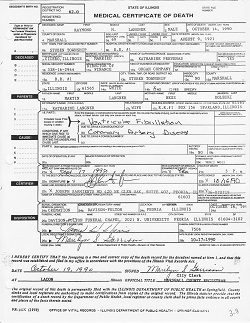 Raymond
Martin LANGNER died 14 Oct 1990, at home in Sparland, Marshall County,
Illinois, of cardiac arrest, while watching a football game on tv.
Raymond
Martin LANGNER died 14 Oct 1990, at home in Sparland, Marshall County,
Illinois, of cardiac arrest, while watching a football game on tv.
[*HJL Herbert Joseph Langner, *KPL Katharine Prevenas Langner, *MBL Margaret Bambrough Langner, *ML Marty Langner, *RML Raymond Martin Langner]
Many of the pictures displayed are small versions. Simply click on the image to see a bigger image.
Our thanks to Dennis Partridge and Marsha Bryant for graciously hosting this LANGNER Family History website on their servers.